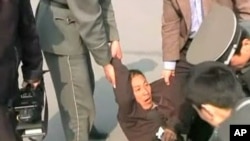China's modernization and its power as a trading nation have made it an increasingly important player in the international arena. Yet, as its influence grows, rights activists and legal experts say China's treatment of its citizens and of their demand for basic human rights casts a shadow over the country's many advances.
Scenes of petitioners, gathering outside local government offices and court houses to air their grievances, are increasingly common in China. Analysts say the rallies are a sign of the Chinese government's gradual acceptance of some dissent. But such scenes are only part of the picture. Activists and legal experts note that government tolerance has its limits.
At a recent U.S. congressional hearing on political prisoners in China, legal expert Jerome Cohen said that vague Chinese criminal laws allow authorities to brand a wide range of individuals as political prisoners.
"Land disputes, property disputes, environmental, labor problems, birth control problems -- these are all often local disputes that make people become political prisoners because there is no satisfactory outlet for their peaceful protest. And many of them, of course, get locked up," said Cohen.
Chen Guangcheng, a blind, self-taught legal expert in China, is one example. Chen was sentenced to four years in prison for "damaging property and organizing a mob to disturb traffic" after he documented cases of forced abortions and other abuses by local family planning officials.
Although his sentence ends in September, human rights experts say his persecution is unlikely to be over.
Jerome Cohen says political prisoners are often deprived of political and human rights for years after they are released.
"After that period of deprivation is over, these people are often subjected to continuing surveillance, house arrest, restriction of any meaningful life, with no legal authority whatever," added Cohen.
Joshua Rosenzweig of the Dui Hua Foundation, which seeks to promote human rights in China, says a crackdown targeting rights activists, ethnic minorities and government critics is underway in China.
He says arrests for endangering state secrets more than doubled in 2008, and more arrests and indictments for what are called crimes of endangering state security were carried out in 2008 and 2009 than in the five previous years.
This is a sign, he says, that hardliners in the Chinese government are consolidating their power.
"I believe that the situation that I've described here is a consequence of the Chinese leadership's acquiescence to a hard-line element within the [communist] party that sees harsh criminal justice measures as superior to building the rule of law," said Rosenzweig.
Human rights activists and legal experts say the United States should do more to support those in China who struggle to promote the rule of law.
Some have said more frequent and in-depth discussions between U.S. and Chinese officials on human rights are needed. Others have urged President Barack Obama to meet with former Chinese political prisoners at the White House to show U.S. support for civil society in China.
Authorities in Beijing, however, stress that Chinese citizens' rights are guaranteed by law and that outsiders have no right interfering in the country's legal affairs.













